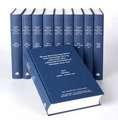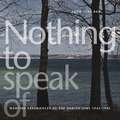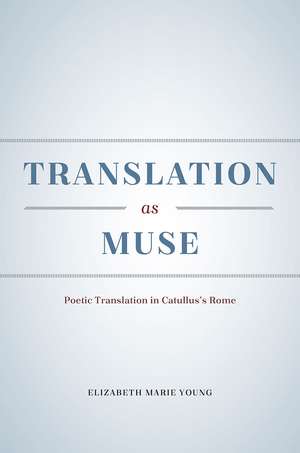Translation as Muse: Poetic Translation in Catullus's Rome: Emersion: Emergent Village resources for communities of faith
Autor Elizabeth Marie Youngen Limba Engleză Hardback – 5 sep 2015
Poetry is often said to resist translation, its integration of form and meaning rendering even the best translations problematic. Elizabeth Marie Young disagrees, and with Translation as Muse, she uses the work of the celebrated Roman poet Catullus to mount a powerful argument that translation can be an engine of poetic invention.
Catullus has long been admired as a poet, but his efforts as a translator have been largely ignored. Young reveals how essential translation is to his work: many poems by Catullus that we tend to label as lyric originals were in fact shaped by Roman translation practices entirely different from our own. By rereading Catullus through the lens of translation, Young exposes new layers of ingenuity in Latin poetry even as she illuminates the idiosyncrasies of Roman translation practice, reconfigures our understanding of translation history, and questions basic assumptions about lyric poetry itself.
Catullus has long been admired as a poet, but his efforts as a translator have been largely ignored. Young reveals how essential translation is to his work: many poems by Catullus that we tend to label as lyric originals were in fact shaped by Roman translation practices entirely different from our own. By rereading Catullus through the lens of translation, Young exposes new layers of ingenuity in Latin poetry even as she illuminates the idiosyncrasies of Roman translation practice, reconfigures our understanding of translation history, and questions basic assumptions about lyric poetry itself.
Din seria Emersion: Emergent Village resources for communities of faith
-
 Preț: 273.93 lei
Preț: 273.93 lei - 8%
 Preț: 311.68 lei
Preț: 311.68 lei -
 Preț: 138.81 lei
Preț: 138.81 lei -
 Preț: 115.82 lei
Preț: 115.82 lei -
 Preț: 144.80 lei
Preț: 144.80 lei -
 Preț: 185.37 lei
Preț: 185.37 lei -
 Preț: 161.27 lei
Preț: 161.27 lei -
 Preț: 548.71 lei
Preț: 548.71 lei -
 Preț: 208.31 lei
Preț: 208.31 lei - 18%
 Preț: 348.59 lei
Preț: 348.59 lei -
 Preț: 128.69 lei
Preț: 128.69 lei -
 Preț: 182.98 lei
Preț: 182.98 lei -
 Preț: 216.89 lei
Preț: 216.89 lei - 18%
 Preț: 2261.34 lei
Preț: 2261.34 lei - 8%
 Preț: 563.24 lei
Preț: 563.24 lei -
 Preț: 106.35 lei
Preț: 106.35 lei -
 Preț: 183.89 lei
Preț: 183.89 lei -
 Preț: 229.92 lei
Preț: 229.92 lei - 9%
 Preț: 352.77 lei
Preț: 352.77 lei - 8%
 Preț: 360.28 lei
Preț: 360.28 lei - 9%
 Preț: 353.24 lei
Preț: 353.24 lei -
 Preț: 126.25 lei
Preț: 126.25 lei -
 Preț: 94.22 lei
Preț: 94.22 lei -
 Preț: 176.49 lei
Preț: 176.49 lei -
 Preț: 302.76 lei
Preț: 302.76 lei -
 Preț: 146.50 lei
Preț: 146.50 lei - 8%
 Preț: 564.99 lei
Preț: 564.99 lei -
 Preț: 67.35 lei
Preț: 67.35 lei -
 Preț: 215.51 lei
Preț: 215.51 lei -
 Preț: 138.26 lei
Preț: 138.26 lei -
 Preț: 144.99 lei
Preț: 144.99 lei -
 Preț: 279.55 lei
Preț: 279.55 lei -
 Preț: 156.84 lei
Preț: 156.84 lei - 18%
 Preț: 502.35 lei
Preț: 502.35 lei -
 Preț: 179.04 lei
Preț: 179.04 lei -
 Preț: 167.85 lei
Preț: 167.85 lei -
 Preț: 115.53 lei
Preț: 115.53 lei -
 Preț: 160.63 lei
Preț: 160.63 lei -
 Preț: 307.53 lei
Preț: 307.53 lei - 12%
 Preț: 290.56 lei
Preț: 290.56 lei - 9%
 Preț: 352.50 lei
Preț: 352.50 lei -
 Preț: 208.54 lei
Preț: 208.54 lei - 8%
 Preț: 346.31 lei
Preț: 346.31 lei - 6%
 Preț: 324.95 lei
Preț: 324.95 lei -
 Preț: 125.41 lei
Preț: 125.41 lei -
 Preț: 120.81 lei
Preț: 120.81 lei -
 Preț: 133.99 lei
Preț: 133.99 lei -
 Preț: 101.43 lei
Preț: 101.43 lei -
 Preț: 92.35 lei
Preț: 92.35 lei -
 Preț: 163.52 lei
Preț: 163.52 lei
Preț: 293.56 lei
Preț vechi: 342.25 lei
-14% Nou
Puncte Express: 440
Preț estimativ în valută:
56.17€ • 58.80$ • 46.75£
56.17€ • 58.80$ • 46.75£
Carte indisponibilă temporar
Doresc să fiu notificat când acest titlu va fi disponibil:
Se trimite...
Preluare comenzi: 021 569.72.76
Specificații
ISBN-13: 9780226279916
ISBN-10: 022627991X
Pagini: 288
Dimensiuni: 152 x 229 x 28 mm
Greutate: 0.51 kg
Ediția:1
Editura: University of Chicago Press
Colecția University of Chicago Press
Seria Emersion: Emergent Village resources for communities of faith
ISBN-10: 022627991X
Pagini: 288
Dimensiuni: 152 x 229 x 28 mm
Greutate: 0.51 kg
Ediția:1
Editura: University of Chicago Press
Colecția University of Chicago Press
Seria Emersion: Emergent Village resources for communities of faith
Notă biografică
Elizabeth Marie Young is assistant professor of classical studies and the Knafel Assistant Professor of Humanities at Wellesley College, where she also teaches in the comparative literature program.
Cuprins
Acknowledgments
Introduction Finding Catullus in Translation
1 The Task of Translation in Catullus
2 Excavating the Poetic Emporium: Material and Cultural Capital in the Polymetrics
3 Catullus 4 and the Demographics of Late Republican Alexandrianism
4 Intimate Acts of Reading: Imitation and Self-Expression in the Translation Prefaces (50 and 65)
5 Constructing Callimachus
6 Surpassing the Gods: Infatuation and Agonism in Catullus’ Sappho (51)
Epilogue Toward a Poetics of Lyric Appropriation
Bibliography
Index
Introduction Finding Catullus in Translation
1 The Task of Translation in Catullus
2 Excavating the Poetic Emporium: Material and Cultural Capital in the Polymetrics
3 Catullus 4 and the Demographics of Late Republican Alexandrianism
4 Intimate Acts of Reading: Imitation and Self-Expression in the Translation Prefaces (50 and 65)
5 Constructing Callimachus
6 Surpassing the Gods: Infatuation and Agonism in Catullus’ Sappho (51)
Epilogue Toward a Poetics of Lyric Appropriation
Bibliography
Index
Recenzii
“Presents a meticulous, well-structured analysis of late Republican Roman translation practices as exemplified in the poetry of Catullus. . . . Recommended.”
“Offers a valuable addition to . . . recent interest in recovering ancient translation, arguing persuasively that translation stands at the heart of Roman cultural production and, in particular, of Catullus’ literary program. Through close readings, Young astutely analyzes how Catullus mediates and manipulates Greek and Roman literature, culture, and identity. Along the way, she successfully demonstrates that translation can be not only a specific product or technique, but also an overarching mindset through which Catullus and other Latin speakers negotiated their polyglot Mediterranean.”
“[Young] is a witty and intelligent critic, with whom it is a pleasure to spend time, and whose close reading of the poems is a delight.”
“A fascinating monograph. . . . [Young] offers original readings of a number of Catullan poems as well as a novel understanding of the importance of translation in Roman culture and poetics.”
“An invigorating new study of the poetry of Catullus, and a contribution to our understanding of the extraordinary era in which he lived and wrote.”
“Translation as Muse offers a coherent and stimulating reading of Catullus’s oeuvre. A major strength of the study lies in its readings of individual poems, and Young proves herself a fine literary critic. This book is a valuable contribution to the study of Catullus and of Roman Hellenism.”
“Translation as Muse presents a new theoretical model of Roman translation practice in which drastic alteration of the original in an attempt to outdo it (aemulatio) is the motive force behind literary creation. Tracing Catullus’s part in culturally appropriating the Greek past through radical revision of his source texts, Young produces provocative metapoetic readings of familiar works. Critics should welcome this volume as a major contribution to both Catullan scholarship and translation studies.”
"Translation as Muse will, I hope, be a work that prods and influences not just Catullanists but Classicists more generally. Elizabeth Young’s monograph on Catullan (and Roman) translation is refined and compelling. . . .Translation as Muse displays a real depth of learning, on Catullus’ poetry itself as well as on his Greek antecedents, his Roman historical context and various processes of cultural appropriation in the ancient Mediterranean. It deserves to be read widely by lovers of Latin poetry, and to last beyond its own age."
